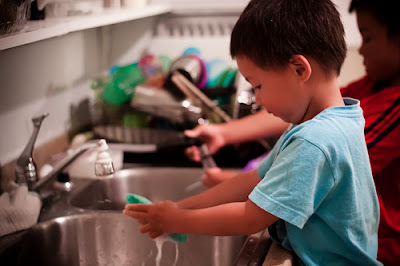We've been teaching our kids chores since they were 2 years old. We have a picture of each of our 3 children, at about the age of 5 or 6, doing diWe've been teaching our kids chores since they were 2 years old. We have a picture of each of our 3 children, at about the age of 5 or 6, doing dishes in their birthday suits because their clothes got so wet! NO! We'll never post those pictures on-line or show them to anyone - but it sure was funny at the time!
The niece I told you about? Jane? Her mother did ALL THE HOUSEHOLD CHORES. She refused to allow the children to work outside of the house. In fact, her children didn't have to do homework. YIKES! Jane is now 20 years old, severely depressed, living at home, not working, and hasn't finished high school.
I look at this as being an extreme case, but maybe it isn't?!
So HOW teach kids to do chores? And WHY?!
Have you ever gone to an event and ended up helping out? And when you helped out you felt that you were a PART OF SOMETHING! Children MUST feel that they are valued, contributing members of the family in order to feel that they are valued and that they are an intrinsic, needed member of the family. And there is exactly one way to for them to develop this feeling - it is a need of children to do chores.
HOW teach kids? Start early - or if you didn't, START NOW!
Parenting Guide : Children Love Doing Chores
Of course kids will complain about doing chores - heck I complain about doing chores. So what? There is a need of children to do them anyway.At what ages should we teach kids chores and what kinds of child jobs are suitable?
Start early - at 2 years old they are fully capable of helping pick up their toys. They can dress themselves, feed themselves, have a hoot bathing themselves (with supervision!) Think about this: when you do something for a child that the child can and SHOULD be doing for him or herself, the underlying, unspoken message you give is "You are not competent. You are NOT capable." That's why we hear the words "NO! ME DO IT!" from 2 year olds. At two-years old, a child already understands that his/her whole job in life is to become capable and competent.
YES! Have a two-year old dress himself, feed herself, walk by himself, bath herself, is messy, imperfect, and sssssssslllllllloooooowwwwwww! BUT our whole job as parents is to raise children to become competent, capable, contributing adults in our society. And it starts at two years old!
We had the list of chores for kids posted on the wall on a bulletin board, in big letters. The chores were divided into three separate sets (3 kids!). And each child was responsible for those chores that week. And it worked. Not without argument, but it worked.
Parenting Guide : Children Love Doing Chores
The rules for breakfast were that it must include a protein, a fruit and a bread of some sort. So our breakfasts, made by children, often included, toast, eggs of some sort - often scrambled eggs or hard boiled eggs, maybe waffles, venison sausage, fruit.My middle son preferred cleaning the bathroom - go figure. He had fun cleaning the toilet. More power to him! My oldest son at 14 years came to me out of the blue,"Mom, I want to make a cheesecake tonight." My response was "what kind of cheesecake and let me go get those ingredients right now for you!!" My daughter has always been excellent at cleaning the kitchen and organizing (funny how her own room stays so messy!!)
As our children hit 14 and were of age to be hired, they got part-time jobs. And we have glowing recommendations from their employers. Each had work ethics learned at home. Each knew how to work and how to learn to work in a new environment - NO! they didn't work easily at home all the time! NO! It wasn't always fun to argue or fight with them about doing their chores. YES! We did argue and fight and insist and YES! They did their chores. And YES! Sometimes doing chores together lead to great conversations and lots of fun!
YES! It's often easier to do it myself! YES! It's easier to let them do it then clean it again afterwards. NO! I don't do that. It is a need of children to have chores, to do chores, and to come back and do those chores again until they are done right. Ashes in their birthday suits because their clothes got so wet! NO! We'll never post those pictures on-line or show them to anyone - but it sure was funny at the time!
The niece I told you about? Jane? Her mother did ALL THE HOUSEHOLD CHORES. She refused to allow the children to work outside of the house. In fact, her children didn't have to do homework. YIKES! Jane is now 20 years old, severely depressed, living at home, not working, and hasn't finished high school.
I look at this as being an extreme case, but maybe it isn't?!
So HOW teach kids to do chores? And WHY?!
Have you ever gone to an event and ended up helping out? And when you helped out you felt that you were a PART OF SOMETHING! Children MUST feel that they are valued, contributing members of the family in order to feel that they are valued and that they are an intrinsic, needed member of the family. And there is exactly one way to for them to develop this feeling - it is a need of children to do chores.
HOW teach kids? Start early - or if you didn't, START NOW!
Of course kids will complain about doing chores - heck I complain about doing chores. So what? There is a need of children to do them anyway.
At what ages should we teach kids chores and what kinds of child jobs are suitable?
Start early - at 2 years old they are fully capable of helping pick up their toys. They can dress themselves, feed themselves, have a hoot bathing themselves (with supervision!) Think about this: when you do something for a child that the child can and SHOULD be doing for him or herself, the underlying, unspoken message you give is "You are not competent. You are NOT capable." That's why we hear the words "NO! ME DO IT!" from 2 year olds. At two-years old, a child already understands that his/her whole job in life is to become capable and competent.
YES! Have a two-year old dress himself, feed herself, walk by himself, bath herself, is messy, imperfect, and sssssssslllllllloooooowwwwwww! BUT our whole job as parents is to raise children to become competent, capable, contributing adults in our society. And it starts at two years old!
We had the list of chores for kids posted on the wall on a bulletin board, in big letters. The chores were divided into three separate sets (3 kids!). And each child was responsible for those chores that week. And it worked. Not without argument, but it worked.
At 9 years old my kids were helping to make breakfast for the family and soon, making breakfast for the family by themselves. In our family, boxed cereals were NOT breakfast. (I consider sugary cereals to be in the same category as candy and we treat them as such.)
The rules for breakfast were that it must include a protein, a fruit and a bread of some sort. So our breakfasts, made by children, often included, toast, eggs of some sort - often scrambled eggs or hard boiled eggs, maybe waffles, venison sausage, fruit.
My middle son preferred cleaning the bathroom - go figure. He had fun cleaning the toilet. More power to him! My oldest son at 14 years came to me out of the blue,"Mom, I want to make a cheesecake tonight." My response was "what kind of cheesecake and let me go get those ingredients right now for you!!" My daughter has always been excellent at cleaning the kitchen and organizing (funny how her own room stays so messy!!)
As our children hit 14 and were of age to be hired, they got part-time jobs. And we have glowing recommendations from their employers. Each had work ethics learned at home. Each knew how to work and how to learn to work in a new environment - NO! they didn't work easily at home all the time! NO! It wasn't always fun to argue or fight with them about doing their chores. YES! We did argue and fight and insist and YES! They did their chores. And YES! Sometimes doing chores together lead to great conversations and lots of fun!
YES! It's often easier to do it myself! YES! It's easier to let them do it then clean it again afterwards. NO! I don't do that. It is a need of children to have chores, to do chores, and to come back and do those chores again until they are done right.









